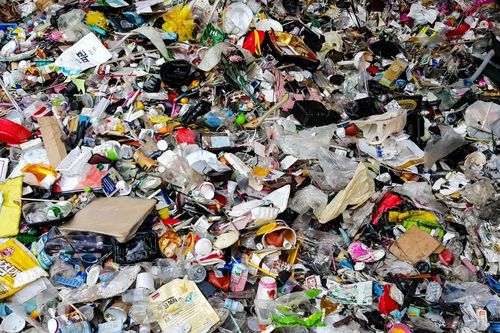FAST-PETase could be a game-changer for the environment.
May 9, 2022

FAST-PETase could be a game-changer for the environment.
Researchers have developed a machine learning model to create a new variant of an enzyme that can degrade plastics in hours or days when it typically takes centuries.
The novel enzyme FAST-PETase (functional, active, stable, and tolerant PETase) is an active PET hydrolase that can deteriorate harmful plastics typically found in landfills.
Polyethylene terephthalate (PET) contributes to 12% of the world’s solid waste. The polymer is found in most consumer packaging, such as soda bottles, salad and fruit packaging.
The enzyme breaks down plastics into smaller parts, which can then be reused. The discovery will allow for large-scale recycling for the industrial sector, which can contribute to the recovery and reuse of plastics on a molecular level.
The enzyme is affordable, portable, and efficient enough to be applied extensively. FAST-PETase also works at temperatures below 50 degrees Celsius.
Previous attempts at developing effective enzymes were challenged by slow reaction rates. The enzymes would also only work in specific temperature ranges and certain pH levels.
“The possibilities are endless across industries to leverage this leading-edge recycling process,” said Hal Alper, professor of chemical engineering at the University of Texas, Austin. “Through these more sustainable enzyme approaches, we can begin to envision a true circular plastics economy.”
Landfill clean-up
Scientists used the ML model to search for bacteria that can break down PET at low temperatures. The FAST-PETase was also found to be very effective in degrading 51 different thermoformed products in a week.
Researchers were also able to prove how a “closed-loop PET recycling process” could be achieved with the new enzyme and resynthesizing PET with recovered monomers.
“This work really demonstrates the power of bringing together different disciplines, from synthetic biology to chemical engineering to artificial intelligence,” said Andrew Ellington, who led the team at UT Austin that developed the ML model.
The findings were published in Nature. The scientists have filed a patent as they explore the enzyme’s practical applications.
Researchers want to scale up the manufacturing of FAST-PETase so it can be used widely in the environmental and industrial sector. Landfill cleanups will be one of the first priorities. Environmental remediation and high-waste producing businesses are other key applications.
You May Also Like
.jpg?width=700&auto=webp&quality=80&disable=upscale)
.jpg?width=700&auto=webp&quality=80&disable=upscale)
.jpg?width=700&auto=webp&quality=80&disable=upscale)


.jpg?width=300&auto=webp&quality=80&disable=upscale)

.jpg?width=300&auto=webp&quality=80&disable=upscale)